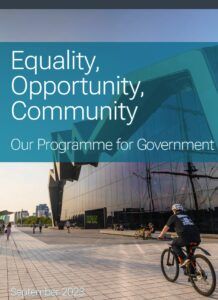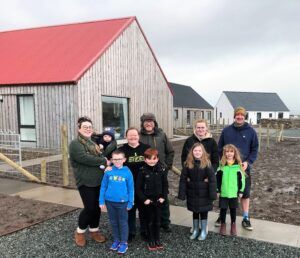
The 23/24 Programme for Government was published on 5 Sept
The Scottish Government revealed its 2023-24 Programme for Government on Tuesday. Featuring contributions from across the Scottish Cabinet, the Programme sets out commitments, legislative plans and spending priorities across all areas of public policy within the Scottish Government’s purview for the coming 12 months.
It is the First Minister Humza Yousaf’s first Programme for Government, and follows his April 2023 policy statement. Both are centred on three ‘national missions’: equality, (“tackling poverty and protecting people from harm”), opportunity (“building a fair, green and growing economy”) and community (“delivering efficient and effective public services”). The First Minister also draws attention to alignment between the Programme for Government and his wider aspirations to create a wellbeing economy, and refers to plans to deliver it through a new “Team Scotland” approach with enhanced collaborations with local government, businesses and voluntary bodies.
Actions around SURF’s primary thematic interest – the regeneration of places with social and economic challenges – is highlighted prominently by the Deputy First Minister and Cabinet Secretary for Finance, Shona Robison. In her section of the Programme, she highlights a £70m commitment in place-based regeneration to, “reduce inequalities and support inclusive economic development in disadvantaged and fragile communities across Scotland”, including through productive reuse of vacant and derelict land. There is a separate note clarifying continued support of the £9m Investing in Communities Fund, the flagship community led regeneration support programme. SURF is represented on independent decision-making panels for the Vacant and Derelict Land Investment Programme, the Regeneration Capital Grant Fund and the Investing in Communities Fund.
Ms Robison also highlights plans to progress implementation of Community Wealth Building, through new approaches to local procurement and partnerships, and to carry out a review of Part Two of the Community Empowerment (Scotland) Act 2015, in addition to actions on planning reform, scaling up pilot projects that support families in poverty, and undertaking a new phase of the Democracy Matters consultation. SURF will soon be inviting members to a consultation event on Democracy Matters, which is taking place online on 24 October.

A Remote & Rural Housing Plan may deliver more initiatives like this 2022 SURF Award winning development in Staffin, Skye
On housing, Ms Robison stated priority actions would include keeping social rents below market rents to alleviate child poverty, reducing the number of people living in temporary accommodation, and investing £752m to the Affordable Housing Supply Programme in 2023/24. She also highlighted the continued promotion of the Housing First approach to reduce homelessness, and the publication of a Remote, Rural and Islands Housing Action Plan later in 2023.
Cabinet Secretary for Constitution, External Affairs and Culture, Angus Robertson, recognises the power of culture and heritage in supporting our communities to thrive. In the next year, the Government will implement a Culture Strategy Action Plan Refresh to, “support the recovery and renewal of the culture sector with a focus on empowering individuals and communities to further develop their own cultural activity” and “championing the economic impact of culture, in particular within the context of community wealth building and creative placemaking.” The challenges here are not to be underestimated. A recent submission from Creative Scotland to the Scottish Parliament notes that a third of its regularly funded organisations are at serious risk of insolvency, and states the current funding situation puts “900 jobs at immediate risk with loss of financial support or freelance opportunities for more than 12,000 artists and creative practitioners.”
Elsewhere in the Programme, Cabinet Secretary for Wellbeing, Economy, Fair Work and Energy, Neil Gray, draws attention to the regeneration potential of Green Freeports in the Firth of Forth and Cromarty Firth/Inverness, and additional employability support for parents in six priority groups to help reduce child poverty. The 2023-24 legislative programme indicates that place-based regeneration is likely to feature in forthcoming Bills on Housing and Land Reform.
In contrast to previous iterations of the Programme for Government, some policy areas that SURF has engaged closely with in recent times, including the 20 minute neighbourhood and living well locally concepts, town centre regeneration, and the Place Principle, do not receive much attention. The roll-out of the Place Principle does, however, continue to be supported by the Scottish Government, including through the Our Place website that SURF has produced content for.
As always, SURF will continue to track, support and inform Scottish Government regeneration-related actions and investments, and we look forward to following progress of the new Programme, and contributing to relevant policy development processes. Our policy section provides recent SURF evidence submissions to the Scottish Government, while those with a particular interest in working with us to explore the linkages between emerging regeneration policy and practice, are encouraged to participate in our People in Place Practice Network, an initiative supported by the Scottish Government.
SCVO, SFHA and the Poverty Alliance are among the bodies to have responded publicly to the Programme for Government. SCVO have stated the Programme, “doesn’t move far or fast enough to address fundamental changes to the operating environment that would recognise the vital role of Scotland’s voluntary sector in delivering on government priorities.” SFHA described the Programme as a missed opportunity: “What was needed was a reinvigorated Affordable Housing Supply Programme.. at the current rate of construction, we simply will not achieve the government’s target of delivering 110,000 affordable homes by 2032.” The Poverty Alliance welcomed some commitments including a Minimum Income Guarantee, and action on childcare, local bus regulation and peak train fares, but felt child poverty targets will be missed without additional actions.
Summary by SURF’s Policy Manager, Derek Rankine.
